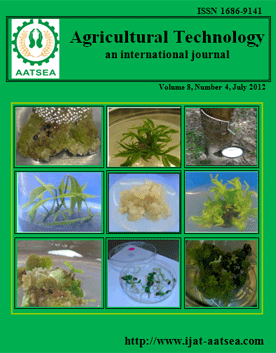ThaiScience
ThaiScience
INTERNATIONAL JOURNAL OF AGRICULTURAL TECHNOLOGY
Volume 14, No. 05, Month SEPTEMBER, Year 2018, Pages 675 - 692
Applications of nano biotechnological microalgae product for improve wheat productivity in semai aird areas
Haggag, W. M., Hoballah, M. M. E. and Ali, R. R.
Abstract Download PDF
Wheat is the most important strategic crop cultivated in the arid and semiarid areas in the world and Egypt that is extremely drought tolerant. However, production and quality of wheat are threatened by major stresses such as diseases and environment stress. In this study, we established a digital database for the land resources in new reclaimed soils in Egypt and for optimum management of wheat crop production and then sustainable agriculture could be achieved . So, Remote sensing data , geographic information system (GIS) techniques was used to establish a land resources database of the newly reclaimed areas located in, Egypt by estimating and mapping soil salinity, properties and normalized difference vegetation index (NDVI). Sinai (Sahl El Tena) area is being a good model for conduct and land use planning, so it selected for this study and compare with the Wadi Natrun. Applications of nano biotechnological microalgae product of nano silica Bluegreen Cyanobacteria - Oscillatoria agardhii improved the wheat resistance to biotic stress as diseases, environment stress, soil ,water irrigation quality , reduce losses and increase yield productivity in some semi-arid region and normal conditions. Blue-green Algae applied treatment increased antioxidant enzymes as catalase (CAT), peroxidase (POD), superoxide dismutase (SOD), as well as grain yield, flour protein and glutamine in most cases- and improved wheat yield quality parameters.
Keywords
Algae, antioxidant enzymes, Blue-green Cyanobacteria– Oscillatoria agardhii, nanobiotechnological, Wheat.INTERNATIONAL JOURNAL OF AGRICULTURAL TECHNOLOGY
Published by : Association of Agricultural Technology in Southeast Asia (AATSEA)
Contributions welcome at : http://www.ijat-aatsea.com
